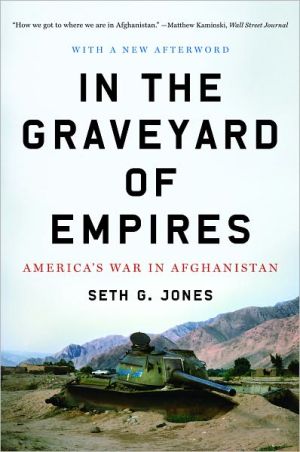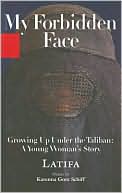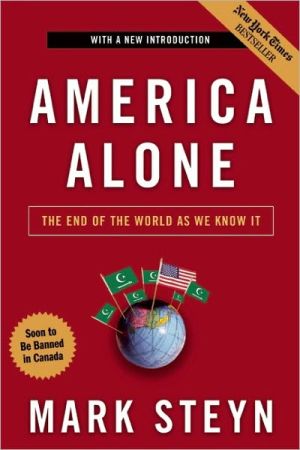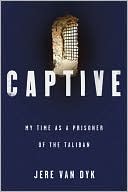In the Graveyard of Empires: America's War in Afghanistan
During his repeated travels through Afghanistan, Seth G. Jones watched American optimism evaporate with increasing dismay. Culling from declassified government documents, new research on insurgencies, and interviews with prominent figures, In the Graveyard of Empires "zero[es] in on what went awry after America's successful routing of the Taliban in late 2001" (Michiko Kakutani, New York Times) to explain how a growing sanctuary for insurgents in Pakistan and a collapsing government in Kabul...
Search in google:
A definitive account of the American experience in Afghanistan from the rise of the Taliban to the depths of the insurgency. The Barnes & Noble Review A few years ago, the Turkish defense minister bragged that the Turkish contingent in the International Security Assistance Force (ISAF) had finished an entire tour in Afghanistan's Wardak province without firing a shot. To some, including his intended audience of Turks, this boast was cause for approval and appreciation. To others -- presumably the battle-weary American soldiers who complained bitterly that ISAF had come to stand for I Saw Americans Fight -- the boast demonstrated all that was wrong or bogus about the NATO effort in Afghanistan, and epitomized the woes that the Americans would eventually have to redouble their efforts to repair. In the Graveyard of Empires, Seth Jones's history of post-invasion Afghanistan, is at its best when it describes the follies and occasional acts of heroism emanating from the patchwork of nations that now take collective responsibility for Afghanistan. The coalition he describes includes many dedicated soldiers and canny diplomats, but it errs frequently, and in the end its members amount to just a few fully committed nations: the U.S., the U.K., Canada, and the Netherlands. Most others commit soldiers only in nominal amounts, or halfheartedly -- under the condition, say, that they build roads and schools instead of killing Taliban, even if the Taliban are destroying the roads or murdering the teachers.
List of Maps and Graphs ixChronology xiIntroduction xix1 Descent into Violence 32 The Mujahideen Era 233 Uncivil War 414 The Rise of the Taliban 525 Al Qa'ida's Strategic Alliance 696 Operation Enduring Freedom 867 Light Footprint 1098 Early Successes 1349 The Logic of Insurgency 15110 Collapse of Law and Order 16311 A Growing Cancer 18312 The Perfect Storm 20313 A Three-Front War 22314 National Caveats 23815 The Water Must Boil 25616 Al Qa'ida: A Force Multiplier 27917 In the Eye of the Storm 29618 Back to the Future 313Afterword 327Acknowledgments 341Notes 345Index 417
\ San Francisco ChronicleOffers a valuable window onto how officials have understood the military campaign.— Robert D. Crews\ \ \ \ \ Wall Street JournalHow we got to where we are in Afghanistan.— Matthew Kaminski\ \ \ The New RepublicSeth G. Jones’s book provides a vivid sense of just how paltry and misguided the American effort has been.… In the Graveyard of Empires will help to show what might still be done to build something enduring in Afghanistan and finally allow the U.S. to go home.— Dexter Filkins\ \ \ \ \ Richmond Times-DispatchA blueprint for winning in a region that has historically brought mighty armies to their knees.— Doug Childers\ \ \ \ \ Publishers WeeklySince 2001, RAND Corporation political scientist Jones (The Rise of European Security Cooperation) has been observing the reinvigorated insurgency in Afghanistan and weighing the potency of its threat to the country's future and American interests in the region. Jones finds the roots of the re-emergence in the expected areas: the deterioration of security after the ousting of the Taliban regime in 2002, the U.S.'s focus on Iraq as its foreign policy priority and Pakistan's role as a haven for insurgents. He revisits Afghan history, specifically the invasions by the British in the mid- and late-19th century and the Russians in the late-20th to rue how little the U.S. has learned from these two previous wars. He sheds light on why Pakistan-a consistent supporter of the Taliban-continues to be a key player in the region's future. Jones makes important arguments for the inclusion of local leaders, particularly in rural regions, but his diligent panorama of the situation fails to consider whether the war in Afghanistan is already lost. (July)\ Copyright © Reed Business Information, a division of Reed Elsevier Inc. All rights reserved.\ \ \ \ \ Library JournalJones (RAND Corp.) examines American successes and failures in Afghanistan and argues for a radically different approach from the primarily kinetic strategy of 2002-03. He considers security, development aid, construction, close coordination with local populations, and—most difficult—solving the problem of insurgent sanctuary in Pakistan. Most readers keeping up with wars in the region will want this.\ \ —Edwin B. Burgess\ \ \ \ \ Kirkus ReviewsA scholarly account of America's unsuccessful effort to avoid the same fate as three other great powers who tried to tame Afghanistan. RAND political scientist Jones (Foreign Service/Georgetown Univ.; The Rise of European Security Cooperation, 2007) begins by describing the failures of Alexander the Great, Victorian Britain and the Soviet Union, reminding readers that the United States missed its first opportunity in the area after the Soviet withdrawal in 1989. Delighted at humiliating our Cold War enemy, American forces withdrew, well-armed Afghan factions turned on each other and the nation descended into lawless chaos. Some semblance of order returned in the '90s when the Taliban conquered most of the country and established an oppressive Islamic regime. In 2001, enraged at its refusal to surrender Osama bin Laden, U.S. forces attacked the country and aided Taliban opponents, who triumphed in a few months. At this point, Jones slows to deliver a blow-by-blow account of how America squandered this victory. As fighting died down, U.S. leaders turned their attention to an invasion of Iraq. During several relatively peaceful postwar years, Afghanistan made progress in establishing a constitutional government, improving education and rebuilding infrastructure. Unfortunately, it never achieved a stable government's primary duty-providing security. Police and officials remained ineffective and corrupt and warlords and criminals reclaimed their turf. The chaos that followed the Soviet withdrawal returned-along with the Taliban and other insurgencies, rested and rejuvenated in Pakistan. Jones admits that America is trying to correct its mistake but rightly wonders if the government will beable to devote as much effort, time and money as was devoted to a similar mistake-not yet corrected-in Iraq. An impressively researched, often grueling illustration of how U.S. leaders failed-once again-to learn from experience. Agent: Eric Lupfer/William Morris Agency\ \ \ \ \ EsquireSeth Jones has the answer to the million-dollar question….until Seth Jones, nobody actually sought an empirical answer. Nobody crunched the numbers.— John H. Richardson\ \ \ \ \ Financial TimesGauging whether the US and its allies can succeed in Afghanistan is only part of what Jones’s excellent book is about.— James Blitz\ \ \ \ \ Foreign AffairsA useful and generally lively account of what can go wrong when outsiders venture onto the Afghan landscape. Those ventures have generally not turned out well…This is ominous, because [Jones] knows too much about recent interventions for his pessimism to be disregarded.— Steven Simon\ \ \ \ \ BooklistThis is a serious work that should be factored in as a new policy as Afghanistan evolves.— Jay Freeman\ \ \ \ \ Library JournalPolitical scientist Jones's (RAND Corporation) groundbreaking, detailed account of American involvement in Afghanistan from the Soviet invasion of 1979 through 2009 is finally available on audio. Drawing from declassified documents and interviews with military, political, and national security experts, Jones holds that the United States followed the same failed path taken in Afghanistan by both Britain and the former Soviet Union. The chapter outlining the theoretical basis for insurgency is particularly enlightening. Voice-over artist William Hughes does an excellent job of presenting this important work, a definitive account of perhaps the most questionable American military and foreign policy exercise since Vietnam. Essential listening for all.—Stephen Hupp, West Virginia Univ. Parkersburg Lib.\ \ \ \ \ The Barnes & Noble ReviewA few years ago, the Turkish defense minister bragged that the Turkish contingent in the International Security Assistance Force (ISAF) had finished an entire tour in Afghanistan's Wardak province without firing a shot. To some, including his intended audience of Turks, this boast was cause for approval and appreciation. To others -- presumably the battle-weary American soldiers who complained bitterly that ISAF had come to stand for I Saw Americans Fight -- the boast demonstrated all that was wrong or bogus about the NATO effort in Afghanistan, and epitomized the woes that the Americans would eventually have to redouble their efforts to repair. \ In the Graveyard of Empires, Seth Jones's history of post-invasion Afghanistan, is at its best when it describes the follies and occasional acts of heroism emanating from the patchwork of nations that now take collective responsibility for Afghanistan. The coalition he describes includes many dedicated soldiers and canny diplomats, but it errs frequently, and in the end its members amount to just a few fully committed nations: the U.S., the U.K., Canada, and the Netherlands. Most others commit soldiers only in nominal amounts, or halfheartedly -- under the condition, say, that they build roads and schools instead of killing Taliban, even if the Taliban are destroying the roads or murdering the teachers.\ Among general surveys of recent Afghan history, Jones's book is rare in its having taken seriously the war concept that was originally conceived: a coalition of NATO armies coming to the defense of a member state, namely the U.S., that was under attack. The U.S. military campaigns in the early days of the war, such as Operation Jawbreaker (the Tora Bora assault on Bin Laden) and the late 2001 horseback Special Forces action in the north, have already drawn plenty of ink, some of it ink well spent. Gary Schroen, the CIA operative who led Jawbreaker, produced a book of his own, and Sean Naylor's Not a Good Day to Die delivers a more serious account than its breathlessly macho title promises.\ Jones describes other campaigns that have attracted less attention, not because they are less interesting battlefield case studies but because the U.S. part in them is secondary. His is one of the few histories to devote more than a few paragraphs, for example, to Operation Medusa, the worthwhile Canadian initiative that ended in the largest land battle in NATO history -- a days-long, costly conventional fight between NATO forces and the Taliban. The Canadian-led coalition routed the Taliban, but the region has remained extremely dangerous. ever since. Jones provides step-by-step coverage of how the battle unfolded, with interviews of the key officers involved.\ If Jones had confined his study to overlooked battles and the NATO politics that continue to keep the war effort from proceeding as efficiently as it might, his book would be laudable and insightful throughout. Unfortunately, its scope is hilariously broad, and its ambitions both more and less than its readers deserve. The narrative veers from battlefield accounts to pre-invasion tales of Taliban brutality to descriptions of the poppy question; there are even several pages on counterinsurgency theory placed awkwardly in the middle of the book. None but the first focus is especially fresh or at all unorthodox in its approach.\ As if to justify its inauspicious and clichéd title, the book starts with a potted chronicle of the previous 2,000-odd years of invasions and failed occupations, from Alexander the Great to the Soviets, and then pronounces a head-shaking warning that we should remember our history. But Jones is a little too quick to embrace the conclusions of the doomed-to-repeat-it school of historical insight, for the lessons of the past are by no means clear. Alexander, for example, famously insisted that his officers take local wives and gave his men reason to believe that most would never see Macedon again; surely forcing an officer to marry an Afghan and never to go home counts as a sign of resolve and a commitment to "local" initiatives, if not of the precise modern liberal variety Jones prefers.\ The Soviet lesson is equally ambiguous. Are we to conclude that big countries always fail to occupy Afghanistan? Or that countries with terroristic policies toward Afghans eventually get booted out? The only clear lesson from these horror tales, from the Hellenistic period to the Anglo-Afghan wars to the Soviet period, is that wars in Afghanistan are not easy. This is hardly news, and hardly justification for so many pages of pre-modern history.\ Jones has visited Afghanistan repeatedly, and his endnotes reveal much original interviewing and greasy-fingered lunching with Afghans. Compared to the re-rehearsed narratives of the rise of the Taliban, and the career path of Osama bin Laden, these interviews pay dividends: he shows flashes of color and detail, illuminating known public figures like Zalmay Khalilzad, as well as other, more obscure Afghan ones. This Afghan perspective is one that Jones includes too sparingly. He suspects (and so do I) that figures like Khalilzad and Canadian generals mean a great deal to each other but not much to the average Afghan, who knows and cares little about politics but is obsessed with achieving security. Afghans do not think in the language of NATO.\ This realization is important. It is a shame, then, that while Jones is smart enough to make it, he fails to deliver anything but a sadly bland and anodyne set of remedies for Afghanistan's ills -- fight corruption, act locally, and undermine the Taliban's sanctuaries in Pakistan. This is a prescription that could have come from Brussels, one that would have been implemented by now if it were anything less than fiendishly difficult. Jones would have done well to explicate these suggestions more clearly, and to come up with a few less familiar. A study that boldly tries to encompass so much might have aimed to be bolder in its advice as well. --Graeme Wood\ Graeme Wood is a staff editor at The Atlantic. His articles and reviews have appeared in many publications, including The New Yorker, Good magazine, and The American.\ \ \







